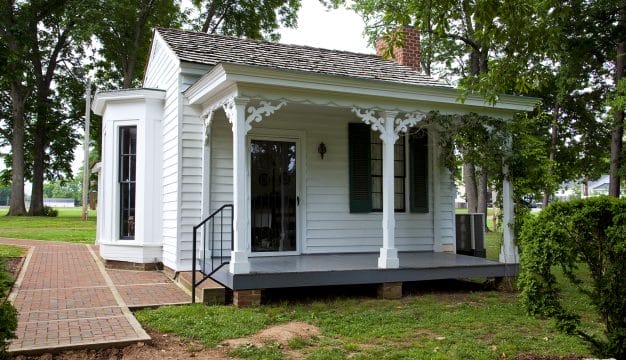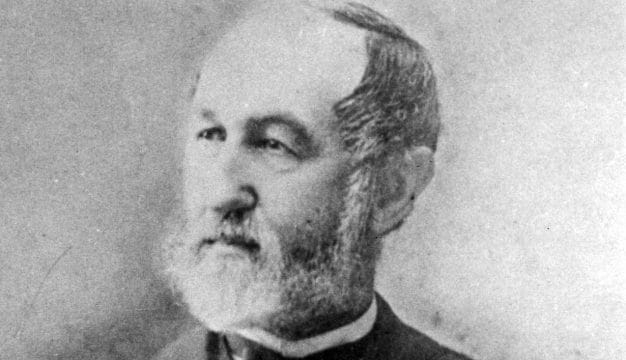Fort Payne
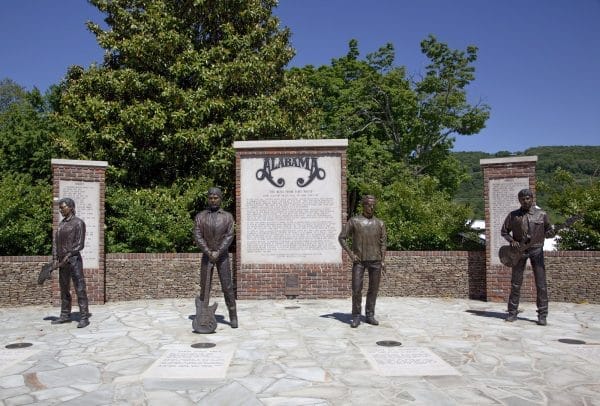 Alabama Statues in Fort Payne
Located in the mountainous northeastern corner of Alabama between Sand Mountain and Lookout Mountain, Fort Payne is the county seat of DeKalb County. A center of the hosiery industry, the town bills itself as “The Sock Capital of the World.” Fort Payne has, since its founding as a military stockade, grown to be the largest town in DeKalb County and is an important contributor to the area’s history, economy, and culture. Fort Payne has a mayor-council form of government. The town is the home of the Grammy Award-winning country music band Alabama, one of the bestselling American musical acts of all time. Fort Payne was also home to the Flock family of racecar drivers and daredevils. Author, filmmaker, and politician Milford Wriarson Howard was born in Fort Payne.
Alabama Statues in Fort Payne
Located in the mountainous northeastern corner of Alabama between Sand Mountain and Lookout Mountain, Fort Payne is the county seat of DeKalb County. A center of the hosiery industry, the town bills itself as “The Sock Capital of the World.” Fort Payne has, since its founding as a military stockade, grown to be the largest town in DeKalb County and is an important contributor to the area’s history, economy, and culture. Fort Payne has a mayor-council form of government. The town is the home of the Grammy Award-winning country music band Alabama, one of the bestselling American musical acts of all time. Fort Payne was also home to the Flock family of racecar drivers and daredevils. Author, filmmaker, and politician Milford Wriarson Howard was born in Fort Payne.
History
Before settlement, the region that includes Fort Payne was Cherokee territory. Some time in the mid-seventeenth century, Cherokee leader William “Big Will” Weber and his followers migrated to the area and established settlements in the valley between Sand Mountain and Lookout Mountain. The area became known as Big Will’s Valley, with the largest settlement being Willstown. For a time, Willstown was home to Sequoyah, inventor of the Cherokee syllabary. The Indian Removal Act of 1830 set the stage for settlement by white migrants from the Carolinas.
Fort Payne is named after U.S. Army Captain John Payne, who in 1838 oversaw the construction of a stockade in Big Will’s Valley near Willstown. The stockade, which came to be called Fort Payne by the soldiers, was built to intern the Cherokee before their forced removal along the Trail of Tears to Indian Territory (now Oklahoma).
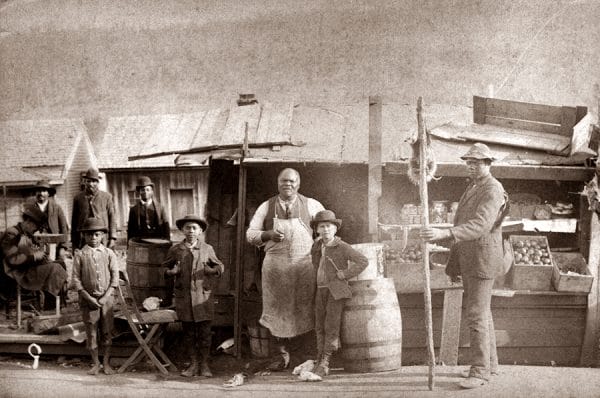 Fort Payne Produce Stand, ca. 1880s
During the Civil War, the area’s isolation and sparse population kept it largely out of the conflict. Fort Payne began to grow after the Civil War with the construction of a railroad between Birmingham and Chattanooga. This rail line through Big Wills Valley attracted the attention of new settlers and investors from the north, spurring population growth and opportunities. Fort Payne was selected by voters on May 5, 1878, to be the seat of county government and remains so today. Not until February 28, 1889, however, was Fort Payne officially incorporated as a town.
Fort Payne Produce Stand, ca. 1880s
During the Civil War, the area’s isolation and sparse population kept it largely out of the conflict. Fort Payne began to grow after the Civil War with the construction of a railroad between Birmingham and Chattanooga. This rail line through Big Wills Valley attracted the attention of new settlers and investors from the north, spurring population growth and opportunities. Fort Payne was selected by voters on May 5, 1878, to be the seat of county government and remains so today. Not until February 28, 1889, however, was Fort Payne officially incorporated as a town.
Economic Development
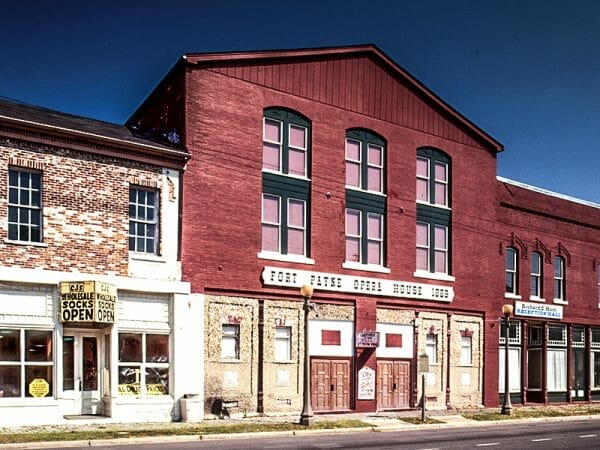 Fort Payne Opera House
The discovery of nearby coal and iron ore initiated Fort Payne’s industrialization in the 1880s. The “boom” times for the town began with the founding of the Fort Payne Coal and Iron Company by wealthy New England speculators in 1889. This investment helped attract additional investors and settlers to the area, sparking a period of phenomenal growth. Wealthy transplanted New Englanders financed the construction of rolling mills, foundries, steel plants, and other industries. During this time, town leaders brought electricity to much of the town, the Fort Payne Opera House was built, and the opulent 125-room DeKalb Hotel served visitors from around the world. When the coal and iron deposits around Fort Payne became unprofitable and wealthy investors withdrew their support, Fort Payne’s economy quickly collapsed. Although the boom lasted only four years, many notable and historic buildings remain from this period.
Fort Payne Opera House
The discovery of nearby coal and iron ore initiated Fort Payne’s industrialization in the 1880s. The “boom” times for the town began with the founding of the Fort Payne Coal and Iron Company by wealthy New England speculators in 1889. This investment helped attract additional investors and settlers to the area, sparking a period of phenomenal growth. Wealthy transplanted New Englanders financed the construction of rolling mills, foundries, steel plants, and other industries. During this time, town leaders brought electricity to much of the town, the Fort Payne Opera House was built, and the opulent 125-room DeKalb Hotel served visitors from around the world. When the coal and iron deposits around Fort Payne became unprofitable and wealthy investors withdrew their support, Fort Payne’s economy quickly collapsed. Although the boom lasted only four years, many notable and historic buildings remain from this period.
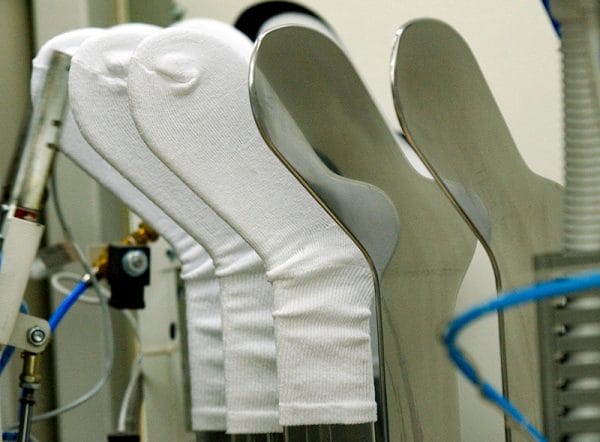 Sock Factory in Fort Payne
In October 1907, the establishment of the Florence Knitting Company hosiery mill gave the economy of Fort Payne a more enduring industrial foundation. During the twentieth century, Fort Payne’s hosiery industry grew to become the largest in the world. By the 1990s, the hosiery industry in the Fort Payne area produced more than 3 million pairs of socks per week and employed some 5,000 people. Many hosiery manufacturers relocated overseas in the 2000s, but the hosiery industry remains an important employer in the area.
Sock Factory in Fort Payne
In October 1907, the establishment of the Florence Knitting Company hosiery mill gave the economy of Fort Payne a more enduring industrial foundation. During the twentieth century, Fort Payne’s hosiery industry grew to become the largest in the world. By the 1990s, the hosiery industry in the Fort Payne area produced more than 3 million pairs of socks per week and employed some 5,000 people. Many hosiery manufacturers relocated overseas in the 2000s, but the hosiery industry remains an important employer in the area.
Demographics
Fort Payne’s population according to 2020 Census estimates was 14,063. Of that number, 82.6 percent identified themselves as white, 18.2 percent as Hispanic, 3.4 percent as African American, 2.4 percent as two or more races, 0.7 percent as Native American, and 0.4 percent as Asian. The city’s median household income was $42,200, and per capita income was $22,089.
Employment
According to 2020 Census estimates, the workforce in Fort Payne was divided among the following industrial categories:
- Educational services, and health care and social assistance (25.2 percent)
- Manufacturing (22.6 percent)
- Retail trade (10.0 percent)
- Other services, except public administration (8.4 percent)
- Construction (6.3 percent)
- Arts, entertainment, recreation, and accommodation and food services (6.0 percent)
- Public administration (4.9 percent)
- Professional, scientific, management, and administrative and waste management services (4.7 percent)
- Transportation and warehousing and utilities (4.6 percent)
- Agriculture, forestry, fishing and hunting, and extractive (3.0 percent)
- Finance, insurance, and real estate, rental, and leasing (2.8 percent)
- Wholesale trade (1.1 percent)
- Information (0.4 percent)
Education
The Fort Payne City School System consists of two elementary schools, one middle school, and one high school.
Transportation
Fort Payne is served by a network of federal and state highways. Interstate 59 runs north-south through Big Wills Valley and connects Fort Payne to Birmingham, Gadsden, and Chattanooga. US Highway 11 parallels Interstate 85 through Fort Payne and Big Wills Valley. State Highway 35 runs east-west through Fort Payne and provides four-lane access across Sand Mountain and Lookout Mountain. Railroad transportation through Fort Payne is provided by the Alabama Great Southern Railroad. Isbell Field is a city owned public-use airport with a 5,000-foot runway.
Events and Places of Interest
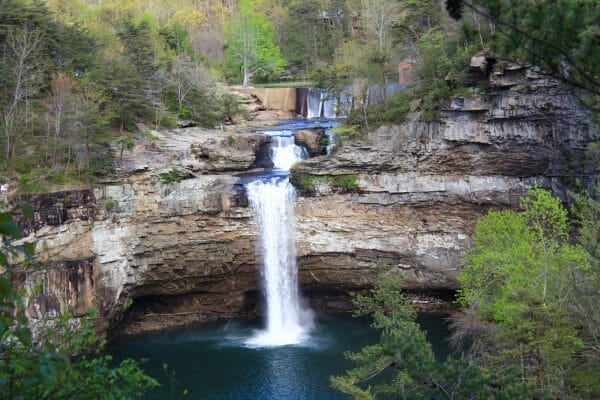 DeSoto Falls
Fort Payne and the surrounding area offer many opportunities for outdoor recreation and cultural enjoyment. The historic Fort Payne Opera House is still in use and hosts live theatrical events throughout the year. Another building from the boom times, the 1891 pink sandstone Fort Payne Depot, is now operated as a local history museum. The Alabama Fan Club and Museum houses memorabilia of the group’s many awards and achievements. The town is a short drive away from both DeSoto State Park and the Little River Canyon National Preserve. These parks protect the nation’s longest mountaintop river, which flows for almost its entire length down the middle of Lookout Mountain.
DeSoto Falls
Fort Payne and the surrounding area offer many opportunities for outdoor recreation and cultural enjoyment. The historic Fort Payne Opera House is still in use and hosts live theatrical events throughout the year. Another building from the boom times, the 1891 pink sandstone Fort Payne Depot, is now operated as a local history museum. The Alabama Fan Club and Museum houses memorabilia of the group’s many awards and achievements. The town is a short drive away from both DeSoto State Park and the Little River Canyon National Preserve. These parks protect the nation’s longest mountaintop river, which flows for almost its entire length down the middle of Lookout Mountain.
Fort Payne is a stop on the World’s Longest Yard Sale and also hosts the annual DeKalb County Fiddlers Convention during the first weekend of August and the Boom Days Heritage Celebration and DeKalb County VFW Agricultural Fair annually in September. The town also holds an annual holiday celebration, Christmas in the Park, which features caroling, a light show, and a parade.
Further Reading
- The Heritage of DeKalb County Alabama, Volume 1. Clanton, Ala.: Heritage Publishing Consultants, 1998.
- The Heritage of DeKalb County Alabama, Volume 2. Clanton, Ala.: Heritage Publishing Consultants, 2008.
